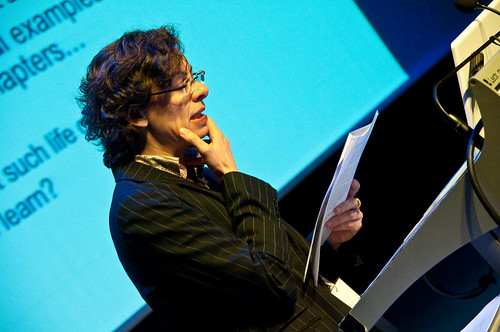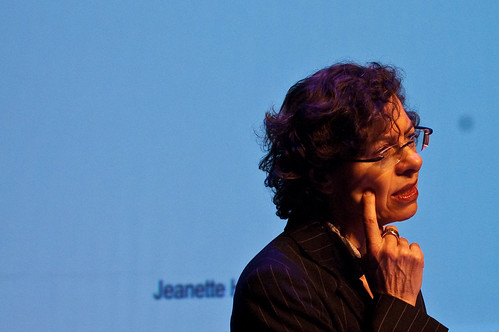
Jeannette Hofmann focuses on how to represent knowledge. It all starts with life cycles of self-regulations online. The first step is one of high expectations in establishing novelty, boundlessness, autonomy, uniqueness and a certain blindness which are all a part of Wikipedia’s self representation. What follows is the feeling of otherness, it is the experience of deadlocks, contention, concentration of power, frustration, disillusionment and crisis. But how do we interpret these life cycles and what can we learn from them?
Hofmann is inspired by the work of Sousa Santos, especially his essay “Toward an Epistemology of Blindness”. Sousa’s main argument is that experience and expectations are not the same and that they are characterized by a certain discrepancy. In modern societies there is a difference between the experience of the past and the expectations of the future. We believe in change, progress and learning.
Santos recognizes two pillars; a pillar of regulation and a pillar of emancipation. Regulation is about maintaining social order and stabilizing expectations. Emancipation establishes good order. It expands distance between experience and expectation. When this is achieved there is a new emancipator movement. Even Knowledge recognizes forms of regulation and emancipation but the forms of knowledge are not the same. Regulation is more about the transition from chaos to order, and Knowledge as emancipation is the struggle against the waste of experience for experimentation. But there is neither a general knowledge nor a general ignorance. This is important to Santos because there is always a certain blindness and this is what Hofmann finds important with regards to Wikipedia.

Call for a plurality of knowledge and practices
All Wikipedia articles must be written from a neutral point of view, representing objectively, proportionately and as far as possible without bias, all significant views that have been published by reliable sources. But what kind of knowledge is assembled in Wikipedia? Reading against the background of Santos, this is problematic. The tension between regulation and emancipation are unavoidable and so there are conflicts related to them. Hoffman argues that we have to change the conflict between “all knowledge” and the Neutral Point of View that allows only “small samples” that are represented at Wikipedia. There is a need to make the debate more constructed. It has to be about social order and change, about regulations and emancipation.
However, the NPoV policy on Wikipedia is misleading and evil. It structures the debates around Wikipedia in a nonsensical way. It doesn’t exist. So, our ambition should be to represent knowledge despite the fact that there is no NPoV.


